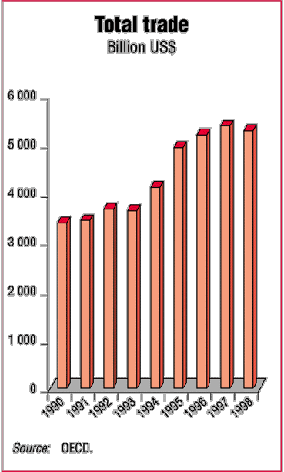|
|
|
|

Focus—Millenium Trade Round
What Seattle did not do
Some background

Officially, it was the Third WTO Ministerial Conference. The ministerial conference is the organisation's highest-level decision-making body. It meets "at least once every two years", as required by the Marrakesh Agreement Establishing the World Trade Organization the WTO's founding charter. The WTO itself was created on 1 January 1995, suceeding the general agreement on tariffs and trade (GATT).
The Seattle ministerial was supposed to mark the launch of major new negotiations to continue liberalising international trade and to review some current trade rules. The WTO's current agreements were the result of the 1986-94 Uruguay Round of negotiations. Although the outcome meant a major reform of world trade rules and a substantial reduction in trade barriers, many participants wanted to see further improvements in the trading system. In particular, the agreements on services (the General Agreement on Trade in Services, GATS) and agriculture state that new negotiations will resume by the beginning of 2000.
These two subjects are definitely going to be in any new negotiations, when they begin. In addition, many WTO members have proposed including other issues in the negotiations. By mid-September, more than 150 proposals had been tabled. The list of documents shows they cover tariffs, anti-dumping, subsidies, safeguards, investment, trade facilitation, electronic commerce, competition policy, fisheries, transparency in government procurement, technical assistance, capacity-building and other development issues, intellectual property protection, and many other subjects in addition to agriculture and services.
Many of the proposals are not specifically for the negotiations, but for programmes of work on other important issues. Most of these have emerged as issues of concern for many countries over the last four years when the Uruguay Round results took effect or were implemented. There were also proposals for the Seattle meeting to produce a special deal to help least-developed countries gain easier access to richer countries' markets, and to develop further work on technical assistance to least developed countries under an integrated framework set up by the WTO and a number of other organisations in 1997.
A stretching timetable?
The Seattle Ministerial Conference was meant to mark the beginning of the negotiations, just as the seven-year Uruguay Round was launched at a ministerial meeting in Punta del Este in 1986 and the six-year Tokyo Round was launched in Tokyo in 1973. Many countries had suggested a deadline of three years for these new talks. Even before the Seattle debacle, past experience had already shown how hard it was to complete large, complicated negotiations within a specified time. If talks resume in 2000, it looks as if three years will be ambitious indeed.